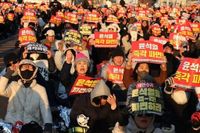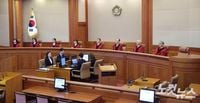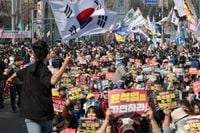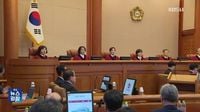On April 4, 2025, the political atmosphere in South Korea is tense as the Constitutional Court prepares to announce its decision on the impeachment trial of President Yoon Suk-yeol. The ruling is set to be revealed at 11 AM, a significant moment that follows 111 days since the National Assembly passed the impeachment motion on December 14, 2024. The outcome of this trial is expected to have far-reaching implications for the nation’s political landscape, economy, and financial markets.
Leading up to the ruling, the Democratic Party leadership convened a closed-door Supreme Council meeting at the National Assembly to strategize their response to the impending decision. Party leader Lee Jae-myung expressed his anticipation for the ruling, stating, "This is a critical moment. We await the Constitutional Court's serious and wise judgment alongside the people." His confidence reflects the party's belief that the impeachment will be upheld, with key members asserting that a unanimous 8 to 0 decision is within reach.
Park Beom-gye, a member of the impeachment prosecution team, emphasized the likelihood of a favorable outcome, suggesting that the court could lean towards a 7 to 1 or even an 8 to 0 vote in favor of impeachment. Lee Geon-tae, a legal spokesperson for the party, echoed this sentiment, asserting, "I am certain there will be an 8 to 0 vote in favor of impeachment. The grounds for impeachment have been clearly established by evidence, witnessed by the entire nation. The justices cannot deny this, and it is legally evident."
The Democratic Party's confidence is mirrored by the preparations in the financial sector, where analysts predict immediate market reactions once the ruling is announced. Han Ji-young, a researcher at Kiwoom Securities, noted, "The financial market is likely to react immediately when the ruling starts at 11 AM. The outcome will significantly influence economic schedules, including trade negotiations with the U.S. and the formation of supplementary budgets."
However, the potential outcomes of the ruling are starkly different. If the Constitutional Court upholds the impeachment, President Yoon will be removed from office immediately. This scenario could lead to a brief period of political stability, as uncertainties surrounding his presidency would dissipate, possibly boosting the domestic stock market. Historically, such outcomes have led to immediate market rebounds, as seen after the impeachment of former President Park Geun-hye.
Conversely, if the court dismisses the impeachment, it could plunge the country into a prolonged period of political deadlock, exacerbating uncertainties in the financial markets. Min Kyung-won from Woori Bank warned, "If the impeachment is rejected, the market will face new uncertainties. The won-dollar exchange rate could surpass 1500 won, leading to increased foreign capital outflows and rising pressure on the currency."
Security measures around the Constitutional Court reflect the high stakes of the day. Traffic has been restricted in Jongno-gu, Seoul, and security checks have been heightened, with journalists reporting multiple verification processes before entering the court premises. The atmosphere is charged, with police barriers set up to manage crowds, indicating the intense public interest in the ruling.
As the justices prepared to deliver their verdict, they conducted final deliberations early in the morning, with Chief Justice Moon Hyung-bae being the last to arrive before the court session. The justices' arrival was closely monitored, with reporters noting the absence of comments from them, underscoring the serious nature of the proceedings.
In the lead-up to the ruling, the five grounds for impeachment have been a focal point of discussion. They include allegations of unconstitutional pre-election campaigning, violations of the Public Official Election Act, hindering National Assembly activities, abuse of power by the election management committee, and violations of legal procedures. Each of these points carries significant weight in determining the outcome of the impeachment.
The implications of the ruling extend beyond immediate political consequences; they also encompass broader societal impacts. Should the court find grounds for impeachment, it would serve as a strong message regarding the limits of presidential power in a democratic society. Conversely, a dismissal could embolden future administrations to act with impunity, raising concerns about the erosion of democratic norms.
As the hour approaches for the announcement, both supporters and opponents of the impeachment gather outside the court, reflecting the divided sentiments among the populace. The outcome is not just a matter of political survival for President Yoon but also a pivotal moment for South Korea’s democracy.
In anticipation of potential market volatility, the government has activated emergency response systems. Financial Services Commission Chairman Kim Byung-hwan has postponed all scheduled events to closely monitor market conditions, while the Financial Supervisory Service has convened a risk review meeting to assess the situation post-ruling.
With all eyes on the Constitutional Court, the nation holds its breath for a decision that will shape the future of South Korea. Whether it leads to a sense of relief or deepens political strife remains to be seen, but one thing is clear: the ruling will have lasting consequences for the country and its governance.



![[윤석열 탄핵 파장] (상) 헌재 ‘인용 vs 기각’ 금융권 파장은?](https://thumbor.evrimagaci.org/UB47_HUA4xoYOVZy_Q0XAcy4UyY=/200x0/tpg%2Fsources%2F6a89b4bd-9a19-43d3-b8c8-7497e8b0a837.jpeg)




